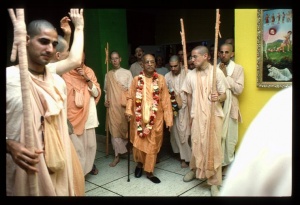SB 5.10.23

A.C. Bhaktivedanta Swami Prabhupada
TEXT 23
- śāstābhigoptā nṛpatiḥ prajānāṁ
- yaḥ kiṅkaro vai na pinaṣṭi piṣṭam
- sva-dharmam ārādhanam acyutasya
- yad īhamāno vijahāty aghaugham
SYNONYMS
śāstā—the governor; abhigoptā—a well-wisher of the citizens as a father is the well-wisher of his children; nṛ-patiḥ—the king; prajānām—of the citizens; yaḥ—one who; kiṅkaraḥ—order carrier; vai—indeed; na—not; pinaṣṭi piṣṭam—grinds what is already ground; sva-dharmam—one's own occupational duty; ārādhanam—worshiping; acyutasya—of the Supreme Personality of Godhead; yat—which; īhamānaḥ—performing; vijahāti—they are released from; agha-ogham—all kinds of sinful activity and faulty action.
TRANSLATION
My dear sir, you have said that the relationship between the king and the subject or between the master and the servant are not eternal, but although such relationships are temporary, when a person takes the position of a king, his duty is to rule the citizens and punish those who are disobedient to the laws. By punishing them, he teaches the citizens to obey the laws of the state. Again, you have said that punishing a person who is deaf and dumb is like chewing the chewed or grinding the pulp; that is to say, there is no benefit in it. However, if one is engaged in his own occupational duty as ordered by the Supreme Lord, his sinful activities are certainly diminished. Therefore if one is engaged in his occupational duty by force, he benefits because he can vanquish all his sinful activities in that way.
PURPORT
This argument offered by Mahārāja Rahūgaṇa is certainly very effective. In his Bhakti-rasāmṛta-sindhu (1.2.4), Śrīla Rūpa Gosvāmī says, tasmāt kenāpy upāyena manaḥ kṛṣṇe niveśayet: (SB 7.1.32) somehow or other, one should engage in Kṛṣṇa consciousness. Actually every living being is an eternal servant of Kṛṣṇa, but due to forgetfulness, a living entity engages himself as an eternal servant of māyā. As long as one is engaged in māyā's service, he cannot be happy. Our Kṛṣṇa consciousness movement aims at engaging people in Lord Kṛṣṇa's service. That will help them become freed from all material contamination and sinful activity. This is confirmed in Bhagavad-gītā (BG 4.10): vīta-rāga-bhaya-krodhāḥ. By becoming detached from material activities, we will be freed from fear and anger. By austerity, one becomes purified and eligible to return home, back to Godhead. The duty of the king is to rule his citizens in such a way that they can become Kṛṣṇa conscious. This would be very beneficial for everyone. Unfortunately the king or president engages people in sense gratification instead of the Lord's service, and such activities are certainly not beneficial for anyone. King Rahūgaṇa tried to engage Jaḍa Bharata in carrying the palanquin, which is a form of sense gratification for the King. However, if one is engaged as a palanquin carrier in the Lord's service, that is certainly beneficial. In this godless civilization, if a president engages people somehow or other in devotional service or the awakening of Kṛṣṇa consciousness, he renders the very best service to the citizens.